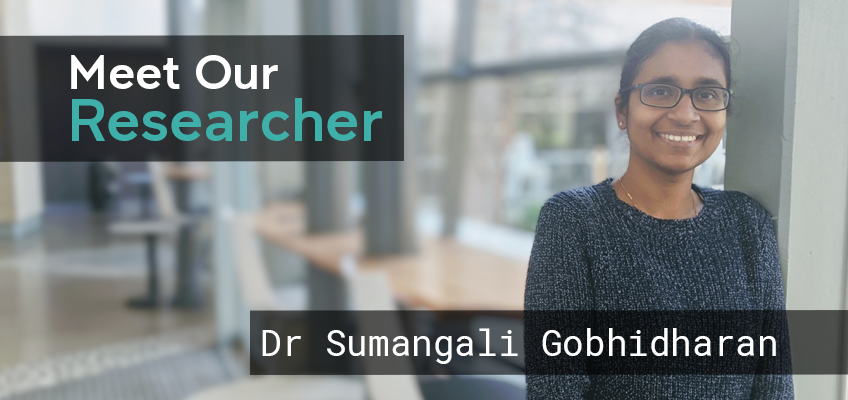13 Oct 2020

Dr Sumangali Gobhidharan originally studied Zoology before moving into Neuroscience and the field of healthy ageing research. What ultimately motivated her to join the field was hearing stories of her Grandfather’s struggle with Alzheimer’s disease and the hope to contribute to healthy brain ageing research.
How did you get into researching the ageing brain?
I am from Sri Lanka and my first degree was in Zoology. Zoology is a field I am passionate about and one which was nurtured by the fact that my father is a keen biologist. However, I was always curious to learn more about the workings of the brain; specifically Neuroscience. My maternal grandfather had dementia and sadly I never had a chance to meet him as he had passed away before I was born. As I grew up, my mother and aunts would tell me how difficult it was when he had dementia. I got the opportunity to study Neuroscience when I received the prestigious Commonwealth scholarship to study MSc in Molecular Neuroscience at the University of Bristol and I was lucky to continue my PhD. in Dr Shelley Allen’s group where I worked on neurotrophins, a family of growth factors and their much lesser known precursors and understanding their role in Alzheimer’s disease.
Did you experience a ‘defining moment’ which led you to this field?
Not a defining moment as such but my grandfather having dementia certainly had an enormous impact on me. I grew up knowing I wanted to understand this field and I received the best opportunity with full scholarships to learn and conduct research.
Do you have any personal interests or activities which are protective behaviours against cognitive decline?
I read a lot and apart from that, my straightforward answer is no. I spend a lot of time commuting which limits my exercise time although I would like to do more.
What are you currently researching?
I am a Research Officer in CHeBA’s Genetics and Epigenomics Group with a primary job role as a Laboratory Manager. I am responsible for the curation of the blood tubes and genetic material from all major longitudinal studies carried out by CHeBA. I also perform molecular biological experiments. At the beginning of this year, I started working with an honours student on her project on circular RNAs in ageing. Unfortunately, she had to leave because of COVID-19 and we were unable to complete the lab work. However, all the groundwork has been done and she has successfully submitted her report as part of her degree. Now, we are back in the lab and have started to continue from where we left.
Why is your research important?
Genetics and epigenetics play an extremely important role in healthy ageing.
We are very interested in understanding the underlying mechanisms with an ultimate goal of changing the future of Alzheimer’s disease and other dementias.
What do you love about working for CHeBA?
I love the people; they are ever so friendly, very helpful and readily share their knowledge. The interdisciplinary collaborations we have within CHeBA itself is intriguing. CHeBA organises excellent seminar series and conferences.
In essence, CHeBA is one of the standout research Centres internationally to have documented and collected study material on longitudinal healthy ageing and it is a privilege to be a part of such a distinguished research community.
What is the ultimate hope you have for your research?
Find better ways to age healthier, find biomarkers for healthy ageing and of course strive to find a cure for dementia.
This interview was undertaken during the COVID-19 self-isolation period. Dr Sumangali Gobhidharan found that having video calls over dinner with her family and friends supported her mental resilience and kept her feeling socially connected while physically isolated.
Donations are fundamental for critical research to continue following COVID-19.
If you would like to discuss supporting Dr Gobhidharan's work specifically, or would like information
on leaving a legacy via a Gift in your Will, please contact h.douglass@unsw.edu.au.

Dr Gobhidharan completed a Doctor of Philosophy in Medicine (Neuroscience) with the School of Clinical Sciences, Faculty of Medicine, in 2014 at the University of Bristol in the United Kingdom. Prior to that she undertook her Master of Science in Molecular Neuroscience with Distinction, with an original Bachelor education at the University of Peradeniya in Sri Lanka in Zoology with First Class Honours. She has received many awards, including a University of Bristol Overseas Postgraduate Research Scholarship, Commonwealth Shared Scholarship, University of Peradeniya Award for Academic Excellence and the Prof F. P. Amerasinghe Gold Medal for Excellence in Zoology.
